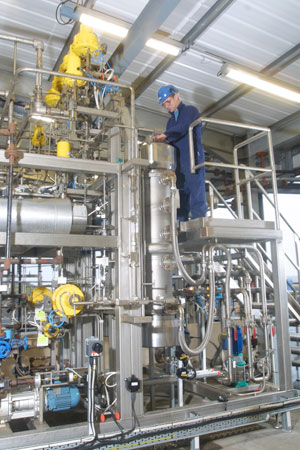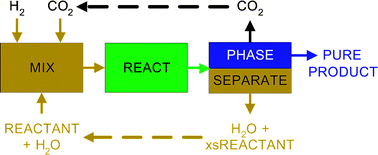The initial attraction of scCO2 in hydrogenation is that, being a gas, it is totally miscible with H2. At the same time scCO2 can act as a solvent for many organic compounds. So there is a possibility of overcoming the mass transport limitations which affect some traditional hydrogenation processes. In practice, the advantage of single phase operation is outweighed by the much greater throughput that can be achieved by operating under multiphase conditions.
Since 1995, we have worked with Thomas Swan and Co Ltd to develop this area and other continuous reactions. Most of the work has been done in fixed-bed reactors of 5mL in volume which in the most favourable of case, have produced up to 1200 mL of product per hour (ca.7.5 tons per year). “The Selective Catalytic Hydrogenation of Organic Compounds in Supercritical Fluids as a Continuous Process” M. G. Hitzler, F. R. Smail, S. K. Ross and M. Poliakoff) Organic Process Research & Development (1998) 2, 137-46. “Continuous Hydrogenation of Organic Compounds in Supercritical Fluids” (M. G. Hitzler and M. Poliakoff) Chem. Commun., (1997) 1667-8.
In 2002 the company opened a 1,000 ton per annum plant based on our research. The plant is sited in Consett, County Durham.

|
The hydrogenation of isophorone yielded a product pure enough that down stream purification was unnecessary “Chemical Reactions in Supercritical Carbon Dioxide: From Laboratory to Commercial Plant” (P. Licence, M. Sokolova, S. K. Ross and M. Poliakoff) Green Chem. (2003) 5, 99–104.

|
Recently we have extended the work in several directions;
- Using immobilised rhodium catalysts and a library of chiral Ligands (Solvias), we have demonstrated that continuous enantioselective hydrogenation can be carried out scCO2 “Continuous Catalytic Asymmetric Hydrogenation in Supercritical CO2” (P. Stephenson, P. Licence, S. K. Ross, M. Poliakoff). Green Chem., (2004) 6, 521-523.
- Many pharmaceutically interesting compounds are insoluble in scCO2. We have shown that in such cases the hydrogenation can be carried out with an organic co-solvent and that scCO2 can also improve the selectivity of the hydrogenation. .”Continuous Flow Hydrogenation of a Pharmaceutical Intermediate, [4-(3,4-Dichlorophenyl)-3,4-dihydro-2H-naphthalenyidene]-methylamine, in Supercritical Carbon Dioxide” (P. Clark, M. Poliakoff and A. Wells) Adv. Synth. Catal. (2007) 349, 2655-2659.
- If the compound to be hydrogenated is a solid but the product is a liquid, the use of an organic co-solvent can make the product difficult to purify. The hydrogenation of levulinic acid is such a case. However, we have shown that, by using H2O as the co-solvent and scCO2 to manipulate the phase behaviour, pure product can be isolated continuously. “Maximising Opportunities in Supercritical Chemistry: the Continuous Conversion of Levulinic Acid to Gamma-Valerolactone in CO2” (R. A. Bourne, J. G. Stevens, J. Ke, and M. Poliakoff) ChemComm (2007) 4632-4634.

|
We always welcome e- mails to martyn.poliakoff@nottingham.ac.uk from those interested in this area or who would like reprints of papers.
